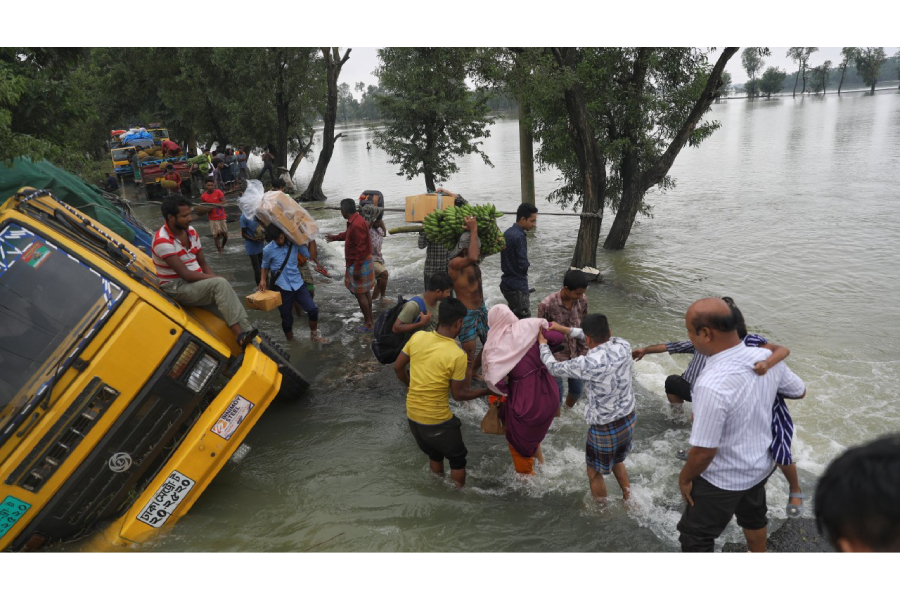Environment
a year ago
Role of youths in tackling flood aftermaths highlighted in UN dialogue

Published :
Updated :

Experts at a UN climate conference commended the contributions of young people in mitigating the impacts of recent floods in Bangladesh.
They called for increased inclusion of youth in global efforts to address ecological imbalances, emphasizing the potential of fresh perspectives and energy in combating climate challenges.
They held the view at a dialogue styled "Youth for Water Justice" held at the "Water for Climate" pavilion during the UN Climate Conference at Baku in Azerbaijan on Saturday.
The dialogue emphasized the crucial role of youth in addressing climate-induced disasters and ensuring water justice.
Speakers highlighted the 2024 August floods in Bangladesh, during which the country's interim government struggled to respond effectively due to its inexperience.
Global powers and the international community also failed to step in meaningfully. Amid this crisis, it was the youth of Bangladesh who led efforts to save lives and rehabilitate flood victims. Their proactive role demonstrated that addressing climate disasters and ensuring water justice are impossible without youth engagement. Experts recommended involving youth as "paid volunteers" under United Nations programs to enhance disaster response and recovery.
The session was chaired by Dr. Ahmed Kamruzzaman Mazumder, with young climate activist Faria Amir serving as moderator.
The keynote address was delivered by Dr. Monzurul Hannan Khan, Executive Director of Nature Conservation Management and a former Additional Secretary of the Government of Bangladesh. Dr. Khan detailed the devastation caused by the floods and the youth's remarkable initiatives to mitigate its impacts.
Panelists included global youth leaders and climate experts who underscored the necessity of empowering youth in climate action.
M. Zakir Hossain Khan, CEO of Change Initiative, stated, "Water justice is integral to climate justice. Effective management of national and transboundary water resources is critical, and youth must lead the way in fostering nature-based development."
Dr. Ahmed Kamruzzaman Mazumder highlighted the emotional and psychological toll of losing ancestral homes and cultural landmarks to climate disasters, urging that these aspects be considered when assessing damages.
He emphasized involving youth in broader environmental challenges, including water justice.
Other speakers shared global perspectives. Mbacke Seck of Waterkeepers Senegal called for integrating youth in combating climate change and ensuring water equity.
Mahnoor Rashid, Chair of the Youth Advisory Board for Climate Forward Pakistan, highlighted the efforts of Pakistani youth in recent disasters, drawing parallels with Bangladesh.
Saidul Islam, Coordinator of the Youth Platform for Sustainable Development, argued, "When both the state and the world failed during the 2024 floods, our youth proved that they are indispensable in tackling climate-induced crises and ensuring water justice. We urge the UN to engage youth as paid volunteers and empower them to lead disaster response efforts."
Speakers also addressed the importance of training and equipping youth in disaster-prone regions.
Asif Iqbal, a researcher on water and climate, advocated for providing local youth with access to emergency resources and integrating them into UN-led training programs to enhance their efficiency.
Kefayet Shakil, a flood survivor from Feni, shared his personal experience, saying, "Though we received no compensation for our losses, the immediate assistance provided by youth was invaluable.
This underscores the need to empower youth further, especially in ensuring water and air justice."
The dialogue concluded with a consensus on the necessity of empowering youth globally to address climate challenges and ensure water justice effectively.


 For all latest news, follow The Financial Express Google News channel.
For all latest news, follow The Financial Express Google News channel.